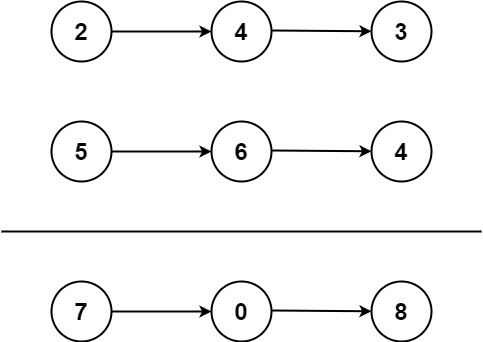Medium
You are given two non-empty linked lists representing two non-negative integers. The digits are stored in reverse order, and each of their nodes contains a single digit. Add the two numbers and return the sum as a linked list.
You may assume the two numbers do not contain any leading zero, except the number 0 itself.
Example 1:
Input: l1 = [2,4,3], l2 = [5,6,4]
Output: [7,0,8]
Explanation: 342 + 465 = 807.
Example 2:
Input: l1 = [0], l2 = [0]
Output: [0]
Example 3:
Input: l1 = [9,9,9,9,9,9,9], l2 = [9,9,9,9]
Output: [8,9,9,9,0,0,0,1]
Constraints:
- The number of nodes in each linked list is in the range
[1, 100]. 0 <= Node.val <= 9- It is guaranteed that the list represents a number that does not have leading zeros.
/**
* Definition for singly-linked list.
* class ListNode {
* int val;
* ListNode? next;
* ListNode([this.val = 0, this.next]);
* }
*/
class Solution {
ListNode addTwoNumbers(ListNode? l1, ListNode? l2) {
ListNode dummyHead = ListNode(0);
ListNode? p = l1;
ListNode? q = l2;
ListNode curr = dummyHead;
int carry = 0;
while (p != null || q != null) {
int x = (p != null) ? p.val : 0;
int y = (q != null) ? q.val : 0;
int sum = carry + x + y;
carry = sum ~/ 10;
curr.next = ListNode(sum % 10);
curr = curr.next!;
if (p != null) p = p.next;
if (q != null) q = q.next;
}
if (carry > 0) {
curr.next = ListNode(carry);
}
return dummyHead.next!;
}
}

